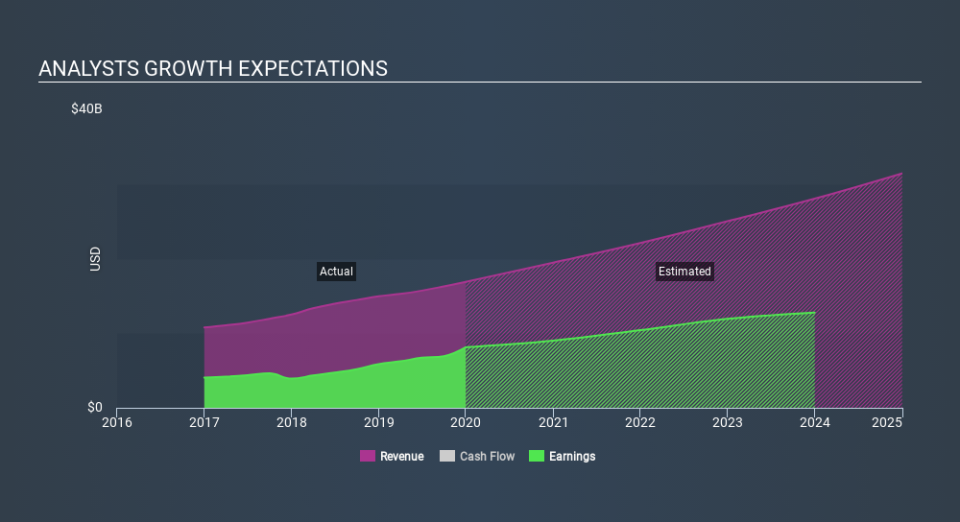Here's What Analysts Are Forecasting For Mastercard Incorporated After Its Full-Year Results

Last week, you might have seen that Mastercard Incorporated (NYSE:MA) released its full-year result to the market. The early response was not positive, with shares down 2.4% to US$316 in the past week. The result was positive overall - although revenues of US$17b were in line with what analysts predicted, Mastercard surprised by delivering a statutory profit of US$7.94 per share, modestly greater than expected. Following the result, analysts have updated their earnings model, and it would be good to know whether they think there's been a strong change in the company's prospects, or if it's business as usual. Readers will be glad to know we've aggregated the latest statutory forecasts to see whether analysts have changed their mind on Mastercard after the latest results.
View our latest analysis for Mastercard
Taking into account the latest results, the latest consensus from Mastercard's 32 analysts is for revenues of US$19.5b in 2020, which would reflect a meaningful 15% improvement in sales compared to the last 12 months. Statutory earnings per share are expected to step up 13% to US$9.01. Before this earnings report, analysts had been forecasting revenues of US$19.2b and earnings per share (EPS) of US$9.03 in 2020. The consensus analysts don't seem to have seen anything in these results that would have changed their view on the business, given there's been no major change to their estimates.
It will come as no surprise then, to learn that the consensus price target is largely unchanged at US$352. That's not the only conclusion we can draw from this data however, as some investors also like to consider the spread in estimates when evaluating analyst price targets. Currently, the most bullish analyst values Mastercard at US$383 per share, while the most bearish prices it at US$268. These price targets show that analysts do have some differing views on the business, but the estimates do not vary enough to suggest to us that some are betting on wild success or utter failure.
It can also be useful to step back and take a broader view of how analyst forecasts compare to Mastercard's performance in recent years. We can infer from the latest estimates that analysts are expecting a continuation of Mastercard's historical trends, as next year's forecast 15% revenue growth is roughly in line with 13% annual revenue growth over the past five years. Compare this with the wider market, which analyst estimates (in aggregate) suggest will see revenues grow 11% next year. So although Mastercard is expected to maintain its revenue growth rate, it's definitely expected to grow faster than the wider market.
The Bottom Line
The most obvious conclusion from these results is that there's been no major change in the business' prospects in recent times, with analysts holding earnings per share steady, in line with previous estimates. Happily, there were no major changes to revenue forecasts, with analysts still expecting the business to grow faster than the wider market. The consensus price target held steady at US$352, with the latest estimates not enough to have an impact on analysts' estimated valuations.
Even so, the longer term trajectory of the business is much more important for the value creation of shareholders. We have estimates - from multiple Mastercard analysts - going out to 2024, and you can see them free on our platform here.
It might also be worth considering whether Mastercard's debt load is appropriate, using our debt analysis tools on the Simply Wall St platform, here.
If you spot an error that warrants correction, please contact the editor at editorial-team@simplywallst.com. This article by Simply Wall St is general in nature. It does not constitute a recommendation to buy or sell any stock, and does not take account of your objectives, or your financial situation. Simply Wall St has no position in the stocks mentioned.
We aim to bring you long-term focused research analysis driven by fundamental data. Note that our analysis may not factor in the latest price-sensitive company announcements or qualitative material. Thank you for reading.

 Yahoo Finance
Yahoo Finance 
